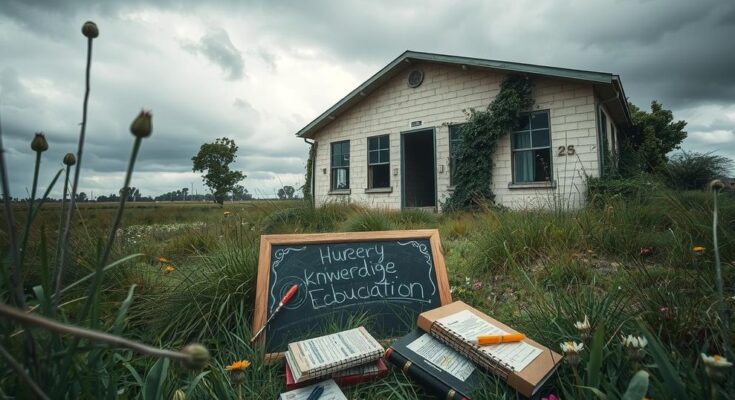Since 2017, Cameroon has experienced a civil war that has severely disrupted education for over 700,000 students. The conflict, rooted in grievances from the anglophone community, has resulted in violence against educational institutions and personnel. Both government and separatists are responsible for the crisis, and immediate actions are needed to restore educational opportunities and ensure safety for students and teachers.
Since 2017, Cameroon has experienced a devastating civil war marked by the cruel use of education as a weapon. This conflict has resulted in significant loss of life, with thousands of deaths and a heinous impact on the right to education for hundreds of thousands of students. Both conflicting parties must reconsider their tactics, as no party truly benefits when education is weaponized.
The anglophone crisis initiated in October 2016 when lawyers in the Northwest and Southwest regions protested against the appointment of unqualified francophone magistrates. Their protests centered on concerns over a lack of understanding of English and Common Law, which was later echoed by teachers protesting the assignment of French-speaking educators to English-speaking regions, exacerbating the educational crisis.
The government’s violent response to these peaceful protests included severe repression, which prompted widespread support for separatist groups striving for the independence of Ambazonia. Thousands of university students joined the protests against the marginalization of the anglophone population, but the cycle of violence only escalated, further complicating the situation and worsening the educational crisis.
According to the United Nations, since the conflict’s onset, over 700,000 students have faced educational disruptions. This has led to a generation’s future being compromised as both government forces and separatists have contributed to the crisis—schools have been boycotted, attacked, and left without adequate protection, creating a climate of constant fear.
Students in the affected regions are left with dire choices. Attending school risks violent retribution from separatists, while staying home limits their future opportunities. Evidence suggests that in the 2018/2019 school year, only about ten percent of schools were operational, with many teachers fleeing the regions due to threats of violence. Meanwhile, ongoing insecurity continues to hinder educational recovery efforts.
Children are subjected to exploitation, including forced labor, recruitment into armed groups, and gender-based violence due to the lack of educational opportunities. The psychological scars inflicted will have long-lasting effects on these youths. The personal loss I endured—my father’s death due to the war—heightened my awareness of education’s transformative power.
In memory of my father, my family established the Jumbam Family Foundation, which provides scholarships for students affected by the crisis. We have relocated students for their safety, and while many have thrived, the emotional impact of their displacement remains profound. Local initiatives, though valuable, reach only a small fraction of those in need.
Both government and separatist groups must acknowledge that using education as a weapon is detrimental to their objectives. The pursuit of justice or unity cannot justify the sacrifice of innocent children’s futures. Concrete actions are essential: schools must be designated as neutral zones, infrastructure must be repaired, qualified teachers must be recruited and retrained, and mental health support must be provided.
The international community must recognize the disruption of education in Cameroon as a humanitarian crisis. Agencies like the African Union and UNICEF should amplify their engagement and resources. Additionally, regional partners should contribute their expertise, and grassroots organizations must be supported in expanding educational opportunities in the crisis-affected regions.
The war’s legacy will not solely be measured by lives lost but also by the dreams deferred and potentials unrealized. Sacrificing another generation’s future for political ends must be avoided; it is vital for all parties to understand that everyone bears the consequences when education falls victim to war.
In summary, the ongoing civil war in Cameroon has transformed education into a battleground, severely impacting the youth and their prospects for the future. Both government and separatist forces must commit to ending the use of education as a weapon, ensuring schools are safe havens. It is imperative for the global community to intervene and support educational recovery efforts in the region to prevent further generational trauma.
Original Source: allafrica.com




